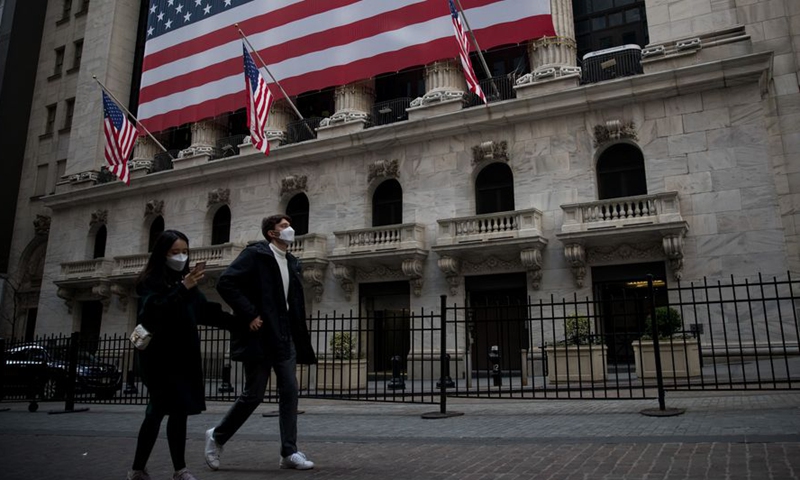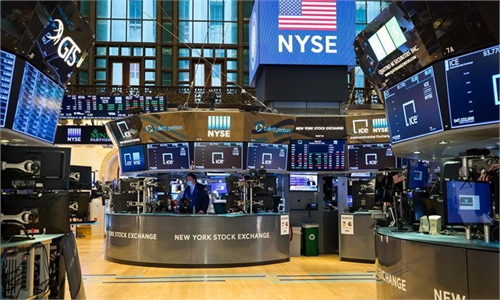Chinese telco shares rally in defiance over US delisting
Biden faces difficult decision over Trump’s financial decoupling: analysts

Pedestrians wearing face masks walk past the New York Stock Exchange (NYSE) in New York, the United States, on March 18, 2020.Photo:Xinhua
Shares of three Chinese telecom giants rallied in Hong Kong on Monday, surging as much as about 6 percent, in what appears to be a defiant move by investors in the three firms, following a US move to delist them from the New York Stock Exchange (NYSE) and a plan by US banks to drop derivatives linked to the companies.
The gains for China Mobile, China Unicom and China Telecom on Monday also showed the limited impact of the US' political moves on the operations of the three companies and investors' expectation that further extreme measures to push for China-US decoupling are unlikely in the final chaotic days of Donald Trump's presidency and beyond, Chinese analysts said.
However, uncertainty remains as to whether incoming president Joe Biden will continue to carry out the existing orders issued by Trump, even if he doesn't roll out new sanctions, they added.
After a bizarre back-and-forth, the NYSE was scheduled to move ahead on Monday to delist the three Chinese telecom firms, citing an earlier executive order by Trump to bar US investors from investing in companies it deems to have links with the Chinese military. The NYSE dropped the plan amid a backlash from China, but later changed again to pursue the delisting.
Apart from the NYSE, US financial institutions - including Goldman Sachs, Morgan Stanley and JPMorgan - said on Sunday that they would delist nearly 500 derivative products linked to the three Chinese telcos, to comply with the US executive order, according to media reports.
However, in a stunning show of defiance over the US sanctions, shares of the three companies rallied on Monday in Hong Kong, with China Mobile gaining 5.78 percent, China Unicom surging 5.67 percent and China Telecom rising 1.53 percent.
"[The delisting] might have some impact on stock prices in the short term, but that also creates an opportunity to buy in… most of the world's incremental capital is in the Asia-Pacific; there is no shortage of investment funds," Francis T. Lui, professor emeritus of the Hong Kong University of Science and Technology, told the Global Times on Monday.
Lui said that other than making it difficult for US investors to access the Chinese market, the move will not cause major disruptions to financial markets. "If the US does not rectify the policy, it will only hurt US investors," he said.
The rally on Monday also showed that market expectations are turning relatively positive over the prospects of further major disruptions to financial markets caused by the Trump administration, which only has eight days left and faces an array of domestic crises, analysts pointed out.
However, while the possibility of extreme measures by Trump to push for decoupling is decreasing, there remains uncertainty as to what the Biden administration would do about the existing executive orders sanctioning Chinese companies, analysts said.
"The future is not so clear yet," Li Yong, deputy chairman of the Expert Committee of the China Association of International Trade, told the Global Times on Monday, noting that Biden should not continue Trump's measures that have seriously damaged China-US economic, trade and financial ties, but he would also face huge pressure if he wants to shift direction.
"Biden says he wants to restore the US' global leadership and restart the US economy, which requires him to move in a positive direction rather than worsening ties with China… however, it cannot be ruled out that Biden might want to use Trump's actions as leverage over China," Li said.
Biden, who will face unprecedented domestic challenges with a raging pandemic and deep political and social divisions, has not spoken about his policies over sanctioning Chinese firms, but has said he would consult with allies over the trade war with China.
In China, officials have harshly criticized the Trump administration's political crackdowns on Chinese companies and repeatedly vowed to take necessary measures to protect Chinese companies' legitimate rights and interests.




